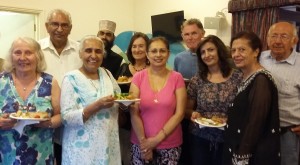Religious and Spiritual Experiences – what can we learn from them?
filed in Event on 25 Jul 2016
 Human beings are naturally spiritual, so research shows, and demonstrate this in many different ways, formal and informal. Understanding the different ways this is expressed and how cooperation is necessary between faiths is essential for good community relations. Interfaith groups have their part to play in achieving this. So stated Marianne Rankin, Director of Communications for the Alister Hardy Trust in a talk organised by Hounslow Friends of Faith in Hounslow on 20th July 2016. Below is an edited version of what she said.
Human beings are naturally spiritual, so research shows, and demonstrate this in many different ways, formal and informal. Understanding the different ways this is expressed and how cooperation is necessary between faiths is essential for good community relations. Interfaith groups have their part to play in achieving this. So stated Marianne Rankin, Director of Communications for the Alister Hardy Trust in a talk organised by Hounslow Friends of Faith in Hounslow on 20th July 2016. Below is an edited version of what she said.
Marianne told the audience the definition of Religious or Spiritual Experience given by Sir Alister Hardy: A deep awareness of a benevolent non-physical power which appears to be partly or wholly beyond, and far greater than, the individual self. Spiritual experience offers a glimpse of the beyond, she said. Awareness ranges from a momentary experience of awe and wonder right across the spectrum to the intensity of mystical experience.
Although it seems many people have spiritual experiences, Marianne said, they are reluctant to speak about them, often for many years. But as soon as they are encouraged to do so, they share what they have experienced at great depth. There have been accounts of spiritual experiences throughout the ages which have been studied by academics in various disciplines – notably William James. In the UK it was Sir Alister Hardy who began the research. He was a Darwinian biologist who lived from 1896-1985. Hardy was the Linacre Professor of Zoology at Oxford, where he taught Richard Dawkins. He looked at the findings of anthropologists who have, in fact, not yet found a civilisation without some recognition of a power beyond the human being, something ‘other’ to which humans relate, and which they revere. Hardy believed that spirituality was a natural part of consciousness. His vision was of a scientific theology, a natural theology.
In 1925 Hardy first became aware of accounts of spiritual experience in the press and began a collection of accounts using a press agency. He then placed adverts in the religious press, with a poor response. So he turned to the secular newspapers, the Guardian, Observer, Times and Daily Mail. There, after a short article or example of a spiritual experience, he posed what is now known as ‘The Hardy Question’: Have you ever been aware of or influenced by a presence or power, whether you call it God or not, which is different from your everyday self?
There was an overwhelming response, as readers sent in about 3000 accounts of experiences they had never dared share with anyone before, for fear of being thought abnormal. This was the beginning of what is now an archive of about 6,000 accounts held at the Religious Experience Research Centre (RERC) at the University of Wales,Trinity Saint David in Lampeter.
Hardy considered that spiritual experience was a universal natural human trait and his successors extended the research from the UK to China despite religion being suppressed there since 1949. Studies were also conducted in Taiwan, Turkey and Tamil Nadu in India. In all cases it was found that the phenomenon of spiritual experience was widespread and among people of all types.
For many people traditional religion is a structure which suits them and underpins their lives as well as offering a community of like-minded people as companions on their religious journey. However, there are probably more for whom in the 21st century, it does not work.
A survey by David Hay, a former Director of RERC and biographer of Sir Alister Hardy showed that in 1987 48% of people reported some kind of spiritual experience. By 2000, despite church attendance having dropped by 20%, this had risen to 76%.
Although in some ways formal religion seems on the margins today, it is clear that, despite the assumption in the 20th century that religion would die out, this has not happened. Religion is still powerful and our world is now threatened by religious fanatics. To combat this, Marianne said, those who understand the true heart of faith need to have a higher profile and to stand up to misinterpretation – particularly of Islam. Organisations like Hounslow Friends of Faith, which bring traditions together and encourage co-operation between religious traditions, are even more important than ever.
If the spiritual side of human nature is real and universal, then religion and spirituality will not die out. The message of love, found in all traditions and the code of conduct expressed in the Golden Rule (Do as you would be done by) must be our aim of working together for peace in the world, she said.
Each year on, for example, Remembrance Sunday, leaders of different religions are seen together, visible evidence of working together. “We need more of this” she said. “Public representation of harmony between them is important as is co-operation in our communities.”
Marianne added that “if we allow that which is beyond to come through, it can transform ourselves and our world. These experiences seem to point the way to understanding what it means to be truly human.”
Marianne Rankin is author of An Introduction to Religious and Spiritual Experience (Bloomsbury 2008). A full version of her talk to HFOF is available from the HFOF Information Officer on the usual contacts.
The photograph shows Marianne fifth from the left, enjoying refreshments with the audience after her talk.
